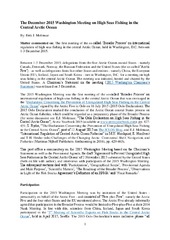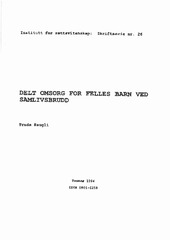Blar i tittel Artikler, rapporter og annet (jus)
Viser treff 46-65 av 260
-
The Concept of Commons and Marine Genetic Resources in Areas beyond National Jurisdiction
(Journal article; Tidsskriftartikkel; Peer reviewed, 2018-11-27)This article explores some of the ways in which marine genetic resources conceptually and normatively intersect with the concept and idea of commons. Through an analysis of the terminological ambiguities and semantic slippages characterizing the usage of the concept of commons in international law, the article addresses questions relation to the idea of global commons and to the multiple reciprocal ... -
A Conceptual Framework for Complex Systems at the Crossroads of Food, Environment, Health, and Innovation
(Journal article; Tidsskriftartikkel; Peer reviewed, 2020-11-20)Climate-smart solutions and practices have the potential to contribute to the UN Sustainable Development Goals (SDGs) of achieving zero hunger; ensuring healthy lives and promoting the wellbeing of humans, animals, and plants; reducing ocean overharvesting and overfishing; tackling climate change; driving economic growth; and promoting innovation. Achieving these goals will require searching for, ... -
Conclusions and Outlook
(Chapter; Bokkapittel, 2016-12-19)The first and clear conclusion from the papers in this book is far from surprising: law of the European Union has impact on national civil procedure. This might concern primary EU law, secondary EU law, case law, fundamental legal principles or soft law instruments. At the same time, there seems to be significant variation on several aspects of the impact of EU law on national civil procedure law. ... -
Constitutional Rights for Children in Norway
(Chapter; Bokkapittel, 2019-12-02)In this chapter, I present and discuss the status of children’s rights in the Norwegian Constitution. The Constitution was amended in 2014 when a new bill of rights was added. The provisions are strongly influenced by international law and, when it comes to children, especially by the general principle of the Convention on the Rights of the Child (crc). I give an overview of the process leading up ... -
The Construction of Ocean Space in Areas Beyond National Jurisdiction. A Fisheries Perspective
(Chapter; Bokkapittel, 2022)This chapter examines the development of fisheries regulation in areas beyond national jurisdiction (ABNJ) from a constructivist approach. In doing so it provides important insights into how the construction of space is influenced by law making and institutional constraints, some of which reflect bias or imbalance in powers structures in international law. Many have defended law as a discreet and ... -
The Contribution of Integrated Marine Policies to Marine Environmental Protection: The Case of Norway
(Journal article; Tidsskriftartikkel; Peer reviewed, 2021-04-12)This article investigates the contribution of the Norwegian integrated marine management (IMM) plans to marine environmental protection and conservation. These plans have been described as international best practice, and the government’s goal is ‘for Norway to be a pioneer in developing an integrated ecosystem-based management regime for marine areas’. The plans pursue other objectives, including ... -
Corto Maltese and the Myriad Narratives of a More-than-Human Ocean: Revisiting Some of UNCLOS’ Ontological Assumptions
(Journal article; Tidsskriftartikkel; Peer reviewed, 2023-01-12)Graphic novels have been previously recognized by scholarly research as a valuable conceptual lens for thinking critically about law. Asserting the need for a deeper engagement with the material foundations, ontological beliefs and epistemological grids that lie under the development of international law of the sea, this article delves into the imaginary oceanic universe of Hugo Pratt’s classic ... -
Covid-19 and Norwegian Civil Justice
(Chapter; Bokkapittel, 2021)Norwegian courts have been digitised at an unprecedented pace during the Covid-19 pandemic. Because case management hearings were already conducted remotely and expert witnesses were often examined remotely, the transition to fully remote hearings has been fairly smooth in Norway, as will be explained in Section 2. However, the implementation of new technology has entailed some difficulties, in ... -
A critical interrogation of the relation between the ecosystem approach and ecosystem services
(Journal article; Tidsskriftartikkel, 2018-01-23)This article offers a critical interrogation of the relationship between two emerging conceptual frameworks whose importance has grown quickly within the context of international environmental law: the ecosystem approach and ecosystem services. Both premised on the concept of the ecosystem, their origin is parallel, but their present and future is convergent and increasingly intertwined. The ecosystem ... -
The December 2015 Washington Meeting on High Seas Fishing in the Central Arctic Ocean
(Chronicle; Kronikk, 2016-02-05) -
Defining the Blue Economy in an Arctic Fisheries and Aquaculture Context: Insights from International Experience
(Journal article; Tidsskriftartikkel; Peer reviewed, 2022-09-28)The paper is intended to show how the idea of the “blue economy” is conceptualized in the three main Arctic coastal regions: Northern Norway, the Russian Arctic Zone and Alaska (USA). This is done through the example of how fisheries and aquaculture function in these three regions and through an analysis of their official policies. The paper examines the current organization of blue economy management, ... -
Delt omsorg for felles barn ved samlivsbrudd
(Research report; Forskningsrapport, 1994) -
Den grenseoverskridende reindriften og beiterettighetene
(Journal article; Tidsskriftartikkel; Peer reviewed, 2020-10-22)Den samiske reindriften er basert på reinens naturlige vandringer mellom vinterens lavbeiter i innlandet og sommerens grøntbeiter ved kysten. Etter at landegrensen mellom Norge og Sverige ble fastlagt i 1751, har mange samer måttet krysse statsgrensen med sine dyr for å opprettholde sin næring. Etter unionsoppløsningen i 1905 har den grenseoverskridende reindriften vært gjenstand for forhandlinger, ... -
Den tidligere umatrikulerte grunnen i Finnmark: Jordfellesskap fremfor statlig eiendom?
(Journal article; Tidsskriftartikkel; Peer reviewed, 2020-06-12)Den tidligere umatrikulerte grunnen i Finnmark har lenge vært betraktet som statens eiendom, noe Samerettsutvalgets rettsgruppe stadfestet i 1993 og som senere er lagt til grunn av Høyeste-rett i Stjernøya- og Nesseby-dommen i hhv. 2016 og 2018. Denne eiendomsretten var tydeliggjort i en resolusjon fra 1775, som angivelig åpnet for utvisning av jord til oppsittere i Finnmark. I dette arbeidet ... -
Det nye grunnsystemets legitimitet (Det nye kvotesystemet mangler legitimitet på grunn av svak lovgivningsprosess)
(Journal article; Tidsskriftartikkel, 2021-11-10)Med knapt flertall (45 mot 42 stemmer) endret Stortinget den 9. februar 2021 grunnsystemet for deltakelse og tildeling av kvoter i ervervsmessig fiske. -
Did an Alleged Ukrainian Attack against the Nord Stream Pipelines Violate the Law of Armed Conflict?
(Others; Andre, 2023-11-21)Preliminary Western intelligence reports have emerged about a purportedly pro-Ukrainian group of six divers conducting the sabotage against the Nord Stream pipelines in September last year. The Ukrainian Government denies any involvement in such an alleged operation. Nonetheless, recently, the Washington Post and Der Spiegel published a joint report which reached the unequivocal conclusion that: ... -
Dis-empowering Gender Stereotypes
(Chapter; Bokkapittel, 2023-04-12)This chapter explores how Western higher education (HE) can benefit from the adoption of illustrated storytelling as a methodology to simultaneously dis-empower gender stereotypes and empower persons in academia. Drawing from indigenous law and methodology and participatory approaches as an essential part of the legal methodology, we explore how critical role-playing developed through storytelling ... -
Doctor Chatbot: The EUʼs Regulatory Prescription for Generative Medical AI
(Journal article; Tidsskriftartikkel; Peer reviewed, 2023-06-30)This article analyses the EUʼs regulation of medical artificial intelligence (AI) from a product safety perspective, concentrating on the interplay between the proposed AI Act (AIA) and the Medical Device Regulation (MDR). Recent advances in AI development illustrate the future potential of generative AI technologies, including those based on Large Language Models (LLMs). In a medical context, AI ... -
The ‘Due Regard’ of Article 234 of UNCLOS: Lessons From Regulating Innocent Passage in the Territorial Sea
(Journal article; Tidsskriftartikkel; Peer reviewed, 2021-10-29)Article 234 of UNCLOS is in many ways exceptional, but it is not unique in the sense that it grants to the coastal state “complete” legislative power. Arguably, “complete” coastal state jurisdiction exists in the territorial sea for the purposes enumerated in Article 21(1), allowing coastal states to adopt ship reporting systems, pilotage, and other routing measures unilaterally. The analysis of ... -
The Duty to Consult the Sámi in Norwegian Law
(Journal article; Tidsskriftartikkel; Peer reviewed, 2020-12-09)This article deals with the duty to consult indigenous peoples and the obligation to involve these peoples in decision-making processes in matters that concern them. After a general review of international legislation and obligations, particularly the ILO Convention no. 169 on Indigenous and Tribal Peoples, the article focuses on how these obligations are implemented towards the indigenous Sámi in ...


 English
English norsk
norsk


















